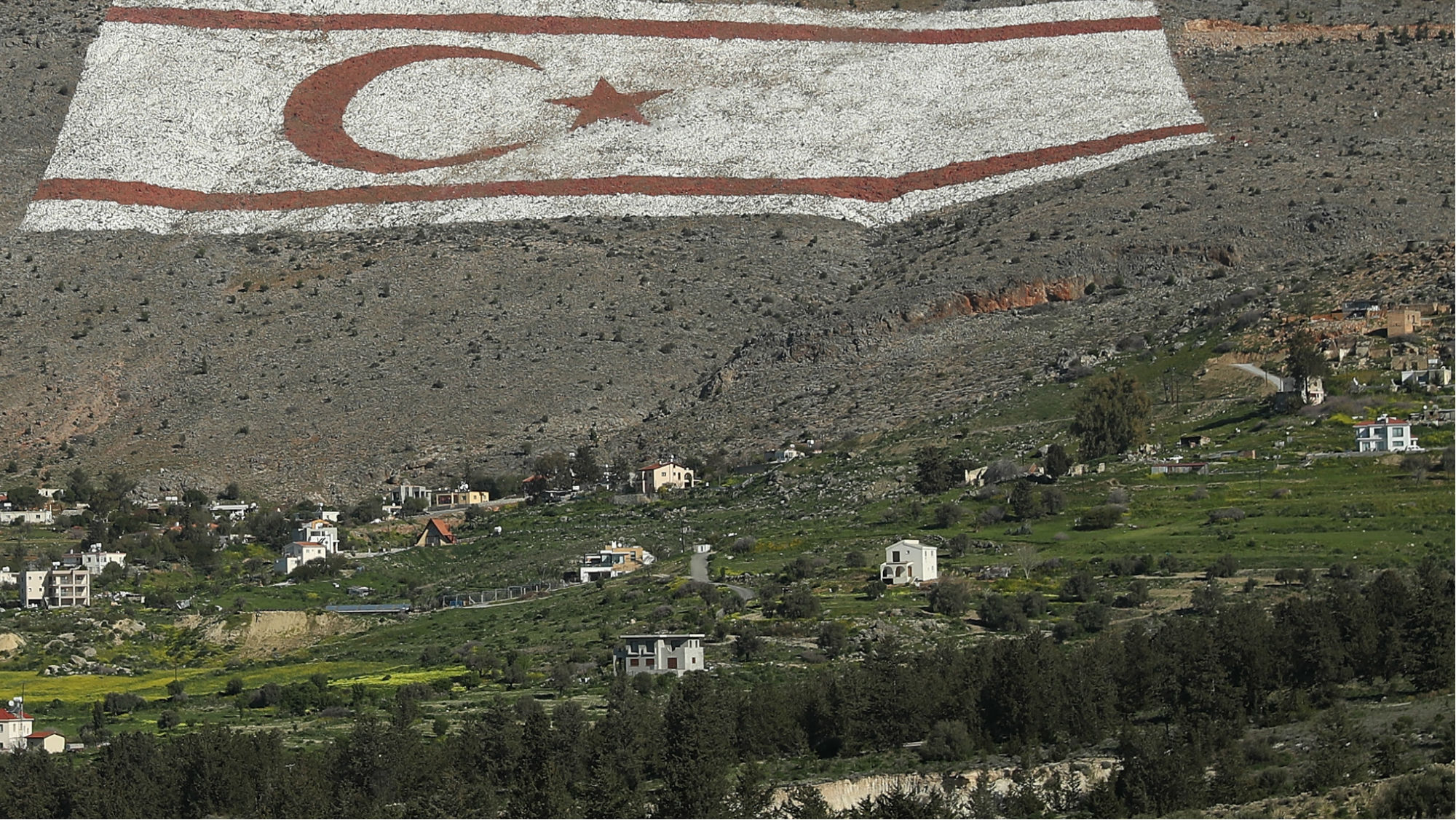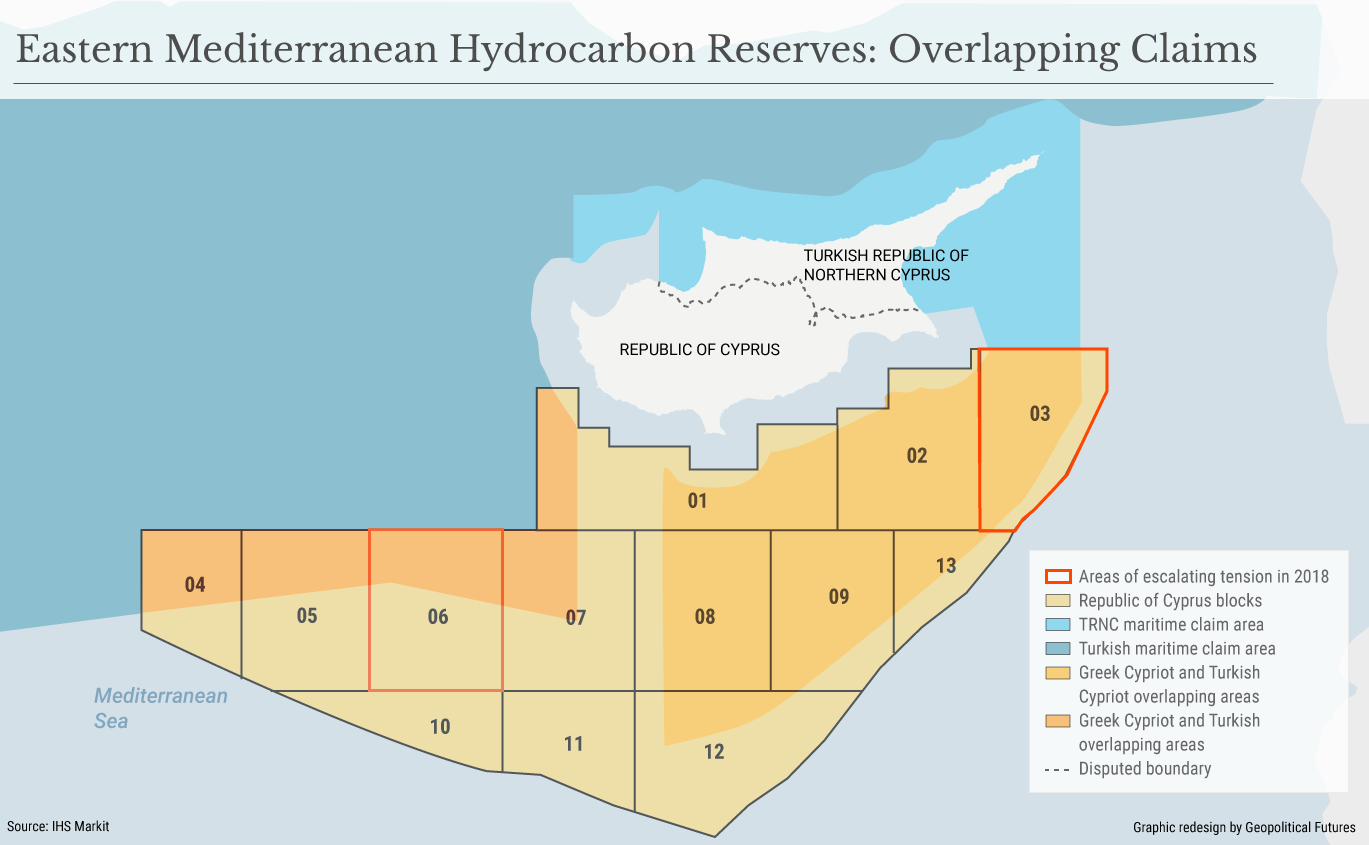By Xander Snyder
While a great deal of attention has been paid to Turkey’s invasion of Afrin, Syria, foreign intervention by Turkey has not been limited to its actions in the Middle East. On Feb. 9, Turkish warships blocked an Italian ship contracted by the Italian energy conglomerate Eni that was heading toward Cyprus to begin exploring for natural gas, marking the first time in recent history that Turkey has actively blocked passage of a European ship. In response, Italy sent one of its frigates (which was already scheduled for deployment for pre-planned NATO exercises) to patrol Cyprus’ exclusive economic zone, although its captain was reportedly ordered to avoid direct confrontation with the Turkish vessels blocking Eni’s drilling rig.
Eni, France’s Total and Exxon Mobil are all licensed by the Greek Cypriot government to engage in natural gas exploration off the southern coast of Cyprus. According to both Eni and Total, which are partners in a Cyprus exploration venture, there could be up to 30 trillion cubic feet of natural gas in the area, which would make it the largest reserve in the Mediterranean. Eni is a private company, but obstruction of the economic interests of a major energy conglomerate by a foreign country will certainly draw the attention of other governments. Turkey claims that Cyprus had no right to dole out drilling contracts to the European companies since the new reserves, which are in block 3 of Cyprus’ exclusive economic zone, fall under the jurisdiction of the Turkish Republic of Northern Cyprus. However, while Turkey claims that Northern Cyprus’ EEZ overlaps with that of the Republic of Cyprus, no other country besides Turkey recognizes Northern Cyprus’ sovereignty.
Turkey’s naval presence in the Eastern Mediterranean is not new – it maintains warships off its western coast, and in 2014 it contracted a seismographic vessel to explore potential gas reserves off the coast of Cyprus. This raises a question: Why would it engage in a confrontation now? The proximate cause is the new gas reserve, discovered by Eni just last week. Turkey wants to become a larger energy exporter, which has driven it in the past to cooperate with Iraqi Kurdistan in exporting oil to Turkey despite its general antagonism toward Kurdish groups. But Turkey’s interests in the Eastern Mediterranean brought it into conflict with the West long before oil and gas came to be the world’s primary sources of energy. What makes Cyprus a flashpoint for Euro-Turkish conflict?
Gateway to the Eastern Mediterranean
Cyprus, which sits about 50 miles (80 kilometers) off Turkey’s southern Mediterranean coast at its closest point, was part of the Ottoman Empire from 1571 until the empire’s collapse after World War I. Before 1571, Cyprus was held by the Italian city-state of Venice, which exposed the Ottomans to the presence of a foreign power. At the time, Venice was a wealthy, merchant city-state that, while not particularly powerful on land, had one of the most formidable navies in Europe. The Ottomans did not have to worry about the risk of a land invasion from Venice, but the Venetian stronghold on Cyprus did pose a major threat to Ottoman shipping and trade. The Ottomans needed to maintain open supply lines to northern Africa, which they depended on for much of their trade and therefore wealth, and Venice frequently used its position on Cyprus to disrupt these trade routes. When the Ottomans invaded the island in 1571, the war that resulted between a European coalition (the Holy League) and the Ottomans saw one of the largest naval battles in history and the largest confrontation of galleys (boats powered by oar) in modern history. While naval battles are no longer fought by boats powered by oars, Cyprus’ location still poses strategic risks to Turkey’s position in the Eastern Mediterranean.
Turkey’s recent confrontation with Italy, while a far more minor affair than in the past, has significant historical precedent, and the geopolitics underlying this precedent remain today. To establish a greater buffer space to its west, Turkey must have control of the Eastern Mediterranean, and this control hinges upon Cyprus. To date, Cyprus has been a weak state, and Turkey’s primary concern in the Mediterranean has been its longtime rival Greece. (Antagonism surfaced this week when Greece claimed that a Turkish coast guard ship purposefully rammed a Greek coast guard ship in the Aegean Sea.) If Cyprus were to open its doors to Western Europe to take advantage of its newfound resources, Turkey would then be faced with a situation in which countries far more powerful than Greece have vested economic interests in the island that depend on Turkey’s exclusion.
That said, the current confrontation is unlikely to lead to imminent conflict between Turkey and Western Europe. Instead, Turkey will use the standoff to pry political and economic concessions from Cyprus, where unification talks overseen by the United Nations broke down last year due to Turkey’s refusal to withdraw its 30,000-40,000 troops stationed on the island. While negotiations have stalled, Turkey hopes that by making life more difficult for Cyprus, Italy and France, the three countries will be more likely to concede to Turkey’s desire to remain on the island. Failing this, and if Italy were to confront Turkey with a substantial naval presence, Turkey would most likely back down and try to negotiate concessions from the natural gas operations off Cyprus’ coast, while maintaining its claim that Northern Cyprus is a sovereign state with rights to its EEZ.
Whether this standoff develops into something more than grandstanding depends in part on Turkey and in part on how deeply Italy and Western Europe need to establish and maintain a presence in the Eastern Mediterranean. Turkey needs to establish a buffer on its Mediterranean shores, but there is also a strategic rationale for Italian and Western European presence in the Eastern Mediterranean, beyond their business interests – a topic for another article.










